 Delta TFS - Model 100b Blacksmith Anvil
Product Report by Robert Nichols AKA quenchcrack
Delta TFS - Model 100b Blacksmith Anvil
Product Report by Robert Nichols AKA quenchcrack
April 8, 2008
I have been looking for a 100-lb. anvil to use for demos and to take to meetings of the Houston Area Blacksmith Association.
After about a year of fruitless searching, I purchased a new Texas Farrier Supply 100# Blacksmith anvil.
My shop anvil is a 170# Old World German Pattern that has served me very well for the past 5 years.
I ordered the anvil from a local Farrier Supply who said they bought from Delta Horseshoe.
It took only a week to get the anvil to Houston and I paid no shipping charges.
The anvil retails for $550 and county taxes added another $32.
Not cheap but not that much more than an eBay anvil of questionable heritage for which premiums are usually paid.
The anvil came wrapped in cellophane, no crate.
The anvil body was painted flat black and it had no rust on it.
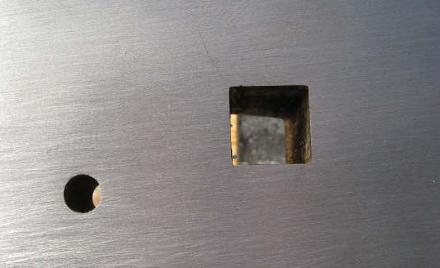
The horn and face were ground to an acceptable finish, no further grinding is necessary except for rounding the edges.
Evidence of grinding to remove superficial defects was found on the horn near the cutting table.
It is only an aesthetic issue and the blemish will cause no problems.
The anvil appears to have been cast on its side.
The parting line was ground but not cleanly.
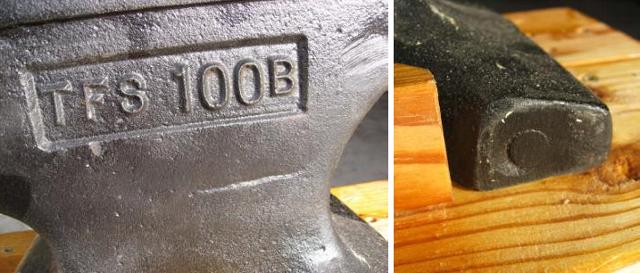
The casting gates were roughly ground off and evidence of their presence remains.
My question is: how much longer would it take to grind these castings with some workmanship and pride?
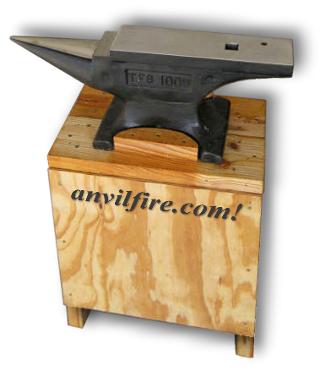 I put the anvil on my garage floor and did the ball bearing test. After repeated testing, I would say that this anvil averaged about 80%-85% rebound over the entire face. I put it on the wooden stand and repeated the test with the same results. The manufacturer says the anvil is hardened to Rc52 and the rebound and file bite suggests this is about right.
I put the anvil on my garage floor and did the ball bearing test. After repeated testing, I would say that this anvil averaged about 80%-85% rebound over the entire face. I put it on the wooden stand and repeated the test with the same results. The manufacturer says the anvil is hardened to Rc52 and the rebound and file bite suggests this is about right.
Last of all, I fired the forge and made my first tool for this anvil: a bench dog type hold down. The anvil rang more than my 170 pounder but my big anvil is chained down to the stand. The TFS anvil is just sitting on top of the stand. I plan to chain it down to reduce the ring. While my hammer control has improved since I did the review of the Russian Anvil, this anvil showed no marking of any kind after my first project.
The anvil returned the hammer well enough.
Not as good as my bigger anvil but it will work just fine.
I like the longer conical horn as it tapers to a finer point than my Old World German.
The hardy hole is almost perfectly 1" square but seems to taper inward slightly.
I will have to make some new hardy tools for this anvil as my Old World has the 1-1/8" hardy hole.
I can recommend this anvil for amateur and professional use.
Other than some surface imperfections, which do not affect the performance, this is a nice anvil and it should last longer than your average blacksmith.
It is vastly superior to the Russian and Chinese ASO's now selling for up to $350 on eBay.
If you are going to spend that much on a new anvil, save your money and buy one of these.
- ASO
- Acronym, Anvil Shaped Object. Generally referring to cast iron anvils, also referred to as "doorstops" or "boat anchors". An object not worthy of the name "anvil" and the waste of good cast iron.
References and Links
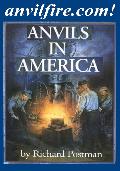
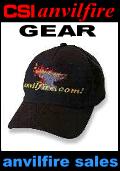
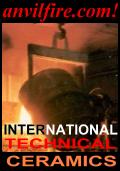


Product Report by Robert Nichols AKA quenchcrack
April 8, 2008
I have been looking for a 100-lb. anvil to use for demos and to take to meetings of the Houston Area Blacksmith Association. After about a year of fruitless searching, I purchased a new Texas Farrier Supply 100# Blacksmith anvil. My shop anvil is a 170# Old World German Pattern that has served me very well for the past 5 years.
I ordered the anvil from a local Farrier Supply who said they bought from Delta Horseshoe. It took only a week to get the anvil to Houston and I paid no shipping charges. The anvil retails for $550 and county taxes added another $32. Not cheap but not that much more than an eBay anvil of questionable heritage for which premiums are usually paid.
The anvil came wrapped in cellophane, no crate. The anvil body was painted flat black and it had no rust on it.
Last of all, I fired the forge and made my first tool for this anvil: a bench dog type hold down. The anvil rang more than my 170 pounder but my big anvil is chained down to the stand. The TFS anvil is just sitting on top of the stand. I plan to chain it down to reduce the ring. While my hammer control has improved since I did the review of the Russian Anvil, this anvil showed no marking of any kind after my first project.
The anvil returned the hammer well enough. Not as good as my bigger anvil but it will work just fine. I like the longer conical horn as it tapers to a finer point than my Old World German. The hardy hole is almost perfectly 1" square but seems to taper inward slightly. I will have to make some new hardy tools for this anvil as my Old World has the 1-1/8" hardy hole.
I can recommend this anvil for amateur and professional use. Other than some surface imperfections, which do not affect the performance, this is a nice anvil and it should last longer than your average blacksmith. It is vastly superior to the Russian and Chinese ASO's now selling for up to $350 on eBay. If you are going to spend that much on a new anvil, save your money and buy one of these.
References and Links